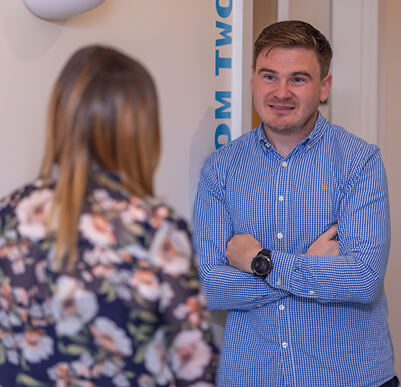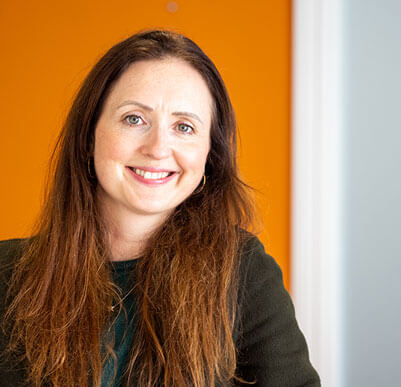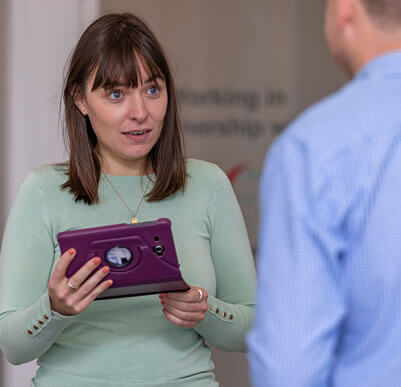Jigsaw Senior Clinician
Jigsaw Senior Clinician
Read what a typical day and week involves for a Senior Clinician at Jigsaw. See current roles.
See available positions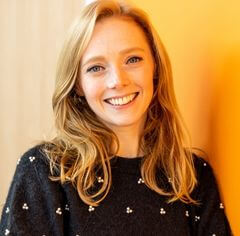
There is no doubt that the best part of my job is the young people I get to meet and work with every day.
What is the best part of your job?
There is no doubt that the best part of my job is the young people I get to meet and work with every day. It’s a huge privilege to be part of someone’s life when they are going through a difficult time, to support them on their mental health journey, and empower them to continue that journey themselves when they leave Jigsaw.
I am also very lucky to be surrounded by an incredible, supportive team in our Jigsaw Dublin City service. While there can be tough moments and days, there is also a lot of laughter.
Working at Jigsaw
We recently ran webinars for clinicians interested in working at Jigsaw. This is a recording.
Why did you choose to work with Jigsaw?
I followed Jigsaw’s journey from its early days. I was drawn to the organisation as it defined ‘young people’ as up to the age of 25. Being in my early 20s at the time, I did not feel equipped to be called an adult, and very much appreciated that!
It was another eight-ish years before I started working for Jigsaw, but I always kept up with their work through the media and their website.
I liked their early intervention and prevention message, and the fact they took a holistic view of mental health. I was aware that young people were involved in ensuring the service was young-person focused, which was unique at that time. And I wanted to be part of an organisation that valued young people’s voices, and their expertise on their own mental health.

Jigsaw is a good place to work if you are interested in working in a non-traditional role.
What does a Jigsaw Senior Clinician do each week?
I would say some elements of the week can vary but the consistent, predictable aspect of each day involves 1:1 support work with young people.
I typically have three-four appointments each day. These appointments may be intervention or assessment sessions. I usually have three initial screening appointments each week and approximately 13 more appointments that are either follow-up assessments or intervention sessions.
During intervention sessions, I collaborate with young people, empowering them to achieve their goals and provide them with a space to work through their areas of concern. Some sessions may require follow-up actions such as check-ins with parents, consultation with other services, or making onward referrals. Time is spent on these kinds of follow-up each day.
My experience before coming to Jigsaw
Before coming to Jigsaw I worked for four years in two different paediatric services. I worked with children with disabilities aged 0-18 in different contexts: home, school, community, respite, and residential.
I really enjoyed working with children and young people however the waitlists were very lengthy and as such staff were unable to provide a level of service that children and teenagers needed.
Jigsaw appealed to me as it seemed a service that ‘did what it said on the tin’. It provided early intervention at an early stage. I was satisfied that I could continue working with young people but would allow me to make a difference rather than fire fighting against waitlists.
What I wondered about before I came to work in Jigsaw
- What would a typical day look like?
- What type of work might I be doing with young people?
- Transdisciplinary work is new to me, what does that entail?
- Will my background as an Occupational Therapist fit within this model of working?
- Will transdisciplinary working be recognised by my professional body?
What makes Jigsaw different?
Personally, I feel that Jigsaw is more progressive than a lot of public services. It strives for change and doesn’t remain stagnant. It strives to respond to the presenting issues of a time and I value this progressive and responsive approach. Jigsaw encourages staff to become involved with initiatives for service development.
Jigsaw is a good place to work if you are interested in working in a non-traditional role. It affords you the opportunity to work with young people at a primary care level if this is an area of work that interests you.
>> Read more about Jigsaw’s transdisciplinary model
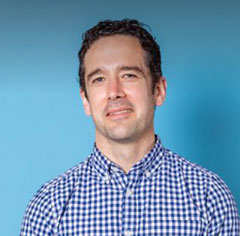
“The pace is fast but fun and enjoyable too. Being in a good team in Limerick makes working with Jigsaw very satisfying.”
What does a typical day look like for you?
My day usually involves between three and five sessions with young people as well as the necessary admin following the sessions. Usually, there is time for a chat and a giggle with the other members of the team too.
The pace is fast but fun and enjoyable too. Being in a good team in Limerick makes working with Jigsaw very satisfying.
My experience before coming to Jigsaw
My first career was as an Army Officer in the Irish Defence Forces.
I later trained in Integrative Psychotherapy and managed a community-based counselling and psychotherapy service in Limerick before joining Jigsaw. As I wanted to work in a clinical role and was interested in working with young people, Jigsaw seemed to be the perfect fit.
What I wondered about before I started?
What was important for me was the opportunity to do clinical work with an organisation that is focused on young people, progressive, and positive to work for.
I wondered how I would fit in coming from a psychotherapy background given that Jigsaw had only recently started to employ psychotherapists.
As a psychotherapist ...
My discipline is a good fit for working in mental health. It has been very interesting to work in Jigsaw alongside clinicians from other professional backgrounds and I really value the input and sharing that happens at group supervision and case management meetings.
The transdisciplinary approach brings a richness of experience and a variety of perspectives that ultimately benefit the mental health of young people beyond what might normally be encountered in other settings.
Vacancies at Jigsaw
